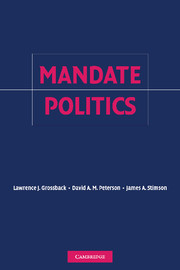Book contents
- Frontmatter
- Contents
- List of Figures
- List of Tables
- Preface
- Acknowledgments
- 1 A Single Time in a Single Place
- 2 The Evolution of Mandates
- 3 Members of Congress Respond
- 4 The Pattern of Congressional Response
- 5 Consequences
- 6 The Irresistible Meets the Unmovable
- 7 Conclusion: A Mandate View of Normal American Politics
- Bibliography
- Index
6 - The Irresistible Meets the Unmovable
Published online by Cambridge University Press: 14 August 2009
- Frontmatter
- Contents
- List of Figures
- List of Tables
- Preface
- Acknowledgments
- 1 A Single Time in a Single Place
- 2 The Evolution of Mandates
- 3 Members of Congress Respond
- 4 The Pattern of Congressional Response
- 5 Consequences
- 6 The Irresistible Meets the Unmovable
- 7 Conclusion: A Mandate View of Normal American Politics
- Bibliography
- Index
Summary
Mandates begin with excitement for the winners and political horror for the losers. They end with the dull thud of reality. “Politics will never be the same again,” we all say. And then a few months later it is.
We close our study of the phenomenon in this chapter by taking a hard look at the aftermath. What is politics like when we have reached a consensus that politics has changed and then – with the real experience of several months – bounced back to our previous understanding? We look at the reinterpretation of the signal, how the clarity, once obvious to all, becomes muddled and contentious. And then we close the electoral cycle by looking at the next election, two years after the mandate. The question of focus is whether all that action by politicians to respond appropriately to the mandate signal is rewarded by voters.
THE RETURN TO NORMAL POLITICS
After a few months into the new Congress, new information flows into the Washington community. New polls are released. Special elections offer a new snapshot of the public. And, perhaps most important, the losing party regroups. Mandate politics are thus transient, a temporary shift in beliefs and behavior subject to new influences. Mandate reactions give way to something else, a return to normal politics. The “irresistible revolution meets the unmovable constitution” (New York Times, Dec. 20, 1995, p. B12) was how the New York Times put it in its retrospective view of the 104th Congress.
- Type
- Chapter
- Information
- Mandate Politics , pp. 161 - 178Publisher: Cambridge University PressPrint publication year: 2006



